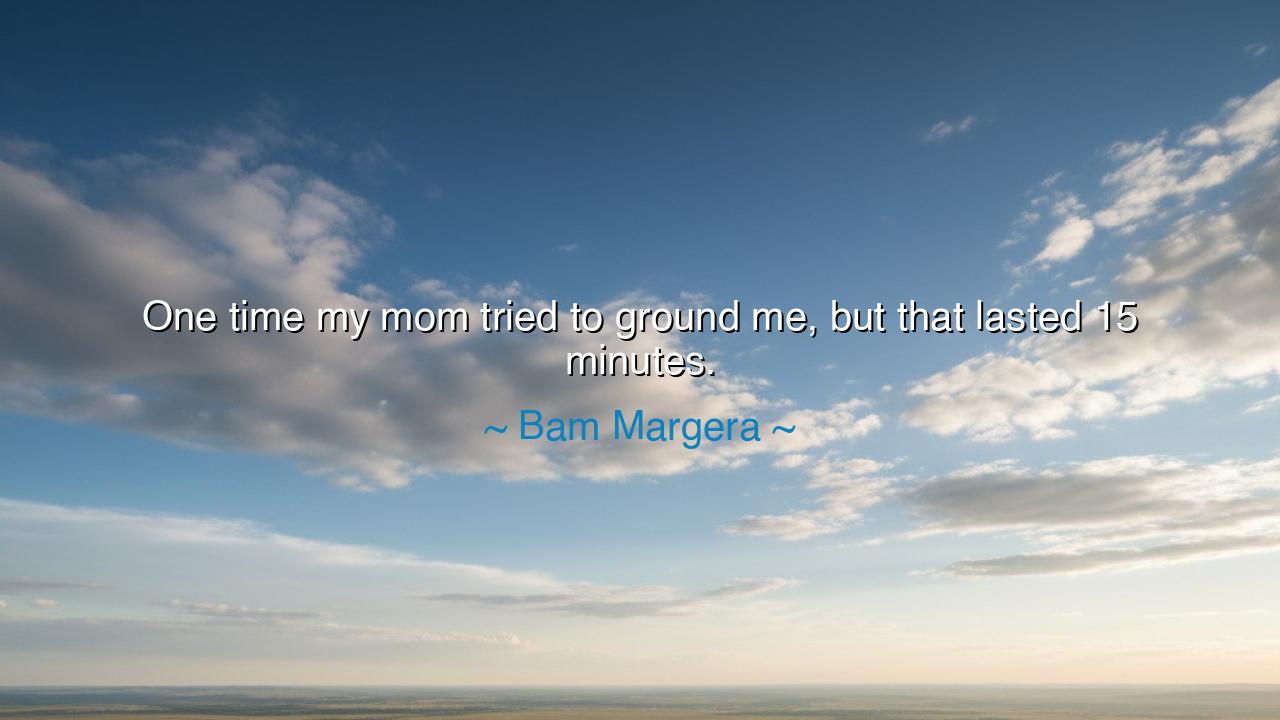
One time my mom tried to ground me, but that lasted 15 minutes.






Hear, O seekers of the unruly spirit, the words of Bam Margera, whose life was lived in defiance of walls and rules: “One time my mom tried to ground me, but that lasted 15 minutes.” At first these words sound like jest, the lighthearted boast of a rebellious youth. Yet within them lies a reflection of freedom, authority, and the eternal struggle between the order of the parent and the wild flame of the child.
First, let us weigh the act of grounding. In the house of discipline, grounding is the ancient tool of parents—a withdrawal of freedom, a command to reflect within the four walls of home. It is not cruelty, but a ritual of correction, meant to bend wayward behavior back toward wisdom. Yet, as Margera confesses, such correction lasted only “15 minutes.” Why? Because the fire within him was too restless to be contained. His spirit answered to another law: not the law of restraint, but the law of daring.
This is the eternal dance between mom and child, between authority and rebellion. For every parent seeks to guide, to protect, to mold. Yet every child yearns to break free, to test the boundaries of power. Margera’s words, though mischievous, are also deeply human—they remind us that growth is born not only of obedience, but of resistance. Just as steel is tested by fire, so too is the parent-child bond tested by rebellion.
Consider, as an example, the story of Alexander the Great. His tutor was Aristotle, who sought to ground him in wisdom, philosophy, and moderation. Yet Alexander was restless, impatient with limits, and soon sought conquest beyond the horizons of Greece. No lesson, however wise, could restrain his spirit for long. In this, he mirrors Margera’s boast: that some souls cannot be contained by ordinary discipline, for they are driven to test the limits of life itself.
The meaning of Margera’s words is not to glorify disobedience, but to reveal the struggle of authority. The mother’s attempt to impose order is a sign of love, for she wishes to protect. Yet her child’s refusal to be held is also natural, for freedom is the hunger of youth. Together, these forces—love and defiance—shape the individual, teaching both sides lessons in patience, humility, and strength.
The lesson is thus: do not despise either the parent’s discipline or the child’s rebellion. Discipline shows love, and rebellion shows spirit. The wise path lies not in crushing one with the other, but in finding the balance where freedom matures into responsibility. A child must learn that freedom has consequence, and a parent must learn that love sometimes means letting go.
So I say to you, dear listener: if you are a parent, guide your children with firmness, but also with grace. Do not measure your worth by whether they obey every command, but by whether they grow into their own strength. And if you are a child, honor the hand that seeks to protect you, even as you test its limits. For one day, you will see that both grounding and rebellion were necessary—that love gave you boundaries, and defiance gave you wings. In this balance lies the true wisdom of life.






AAdministratorAdministrator
Welcome, honored guests. Please leave a comment, we will respond soon